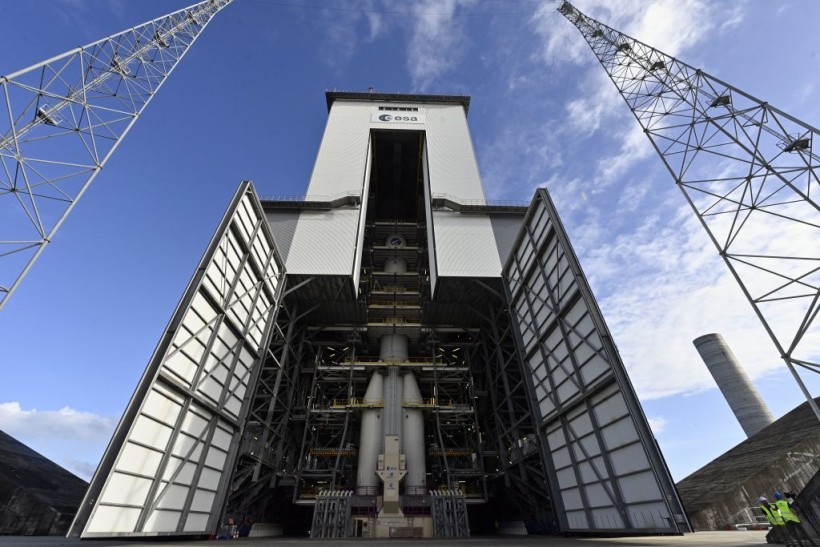The director general of the European Space Agency (ESA), Josef Aschbacher, has announced a mid-2024 launch date for Ariane-6, the next-generation heavy-lift rocket. Successful tests, including a core stage hot-fire, were conducted at the Kourou spaceport.

Illustration picture shows a testing replica of the Ariane 6 space launch system at a royal visit to the Guiana Space Centre in Kourou, French Guiana, France on Wednesday 12 April 2023.
Ariane 6's June 2024 Debut Confirmed with Payload Milestones and Positive Progress
Officials from the testing team announced that the ESA's Ariane 6 rocket, operated by Arianespace, is scheduled for its inaugural space mission no earlier than June 15, 2024. The live-streamed briefing revealed that the payload includes small satellites, including two from NASA, marking a significant milestone.
Ariane 6 has faced a four-year delay, but recent progress is promising. A scale model of the rocket completed a critical hot fire on the pad in Kourou, French Guiana. ESA Director Josef Aschbacher emphasized the importance of this achievement, signaling an acceleration in the project.
Aschbacher cautiously announced the mid-June to end-of-July launch window, acknowledging the unpredictability of rocket science. The successful hotfire test on November 23 was a positive sign, according to Martin Sion, CEO of ArianeGroup. Although the test duration was slightly shorter due to a conservative sensor setting, officials assured it wouldn't impact the actual flight.
Further tests are scheduled for December, evaluating the upper stage's performance in degraded conditions and testing fuel loading in off-nominal situations. Aschbacher highlighted the importance of assessing the launcher's response to non-nominal situations in upcoming key tests.
Despite the confidence gained from the hotfire test, uncertainties remain. There is still ongoing work, including tests and assembly, with the necessity of a launch system qualification review for safety. Arianespace CEO Stéphane Israël expressed optimism about the first commercial flight by the end of 2024 and the potential for 9 to 10 missions annually in the future, provided all goes according to plan.
READ ALSO: Ariane 5 Rocket Finally Brings Communication Services to Space After Nearly a Year
Ariane 5 Legacy: Navigating Toward Ariane 6
For over 25 years, Ariane 5 played a pivotal role in launching European spacecraft, conducting more than 100 missions from 1996 to 2003. Notable endeavors included deploying the James Webb Space Telescope, the Jupiter Icy Moons Explorer (JUICE), and the Rosetta comet spacecraft, alongside contributing to Europe's independent GPS access with the launch of Galileo navigation satellites.
Despite this legacy, Europe's recent dependence on SpaceX, particularly for missions like the Euclid dark matter-hunting launched on July 1, underscored the need for a new generation launch vehicle.
The concept of Ariane 6 emerged in the early 2010s to address evolving launch requirements, aiming to reduce costs and accommodate the simultaneous launch of multiple satellites into diverse orbits. However, technical challenges and the disruptions caused by the COVID-19 pandemic delayed the planned debut in 2020, leading to a period of crisis.
Aschbacher acknowledged the collective efforts of Arianespace, Ariane Group, and the French national space agency (CNES) in overcoming this crisis, emphasizing improved communication through regular and detailed reports.
Learnings from this experience prompted the ESA to diversify European launch options. Aschbacher highlighted a new agreement announced at the European Space Summit, signaling a paradigm shift to enhance competitiveness against SpaceX. The agreement involves short-term financing by ESA members for both Ariane 6 and the lighter-launch Vega-C.
Additionally, ESA committed to increasing launches by private companies to foster diversity and cost reduction, with plans to introduce reusable rockets in the 2030s. Philippe Baptiste, CNES President, lauded the agreement as a step forward, preparing Europe for increased competition while providing more freedom and responsibility to the industry.
RELATED ARTICLE: Space Launch Vehicle Ariane 5 Takes Its Final Flight; Europe Is Left To Rely on US for Space Missions
Check out more news and information on Space in Science Times.




![Earth's Quasi-Moon Kamo‘oalewa Could Originate From Lunar Surface Not Asteroid Belt [Study]](https://1721181113.rsc.cdn77.org/data/thumbs/full/53275/89/56/50/40/earths-quasi-moon-kamo-oalewa-could-originate-from-lunar-surface-not-asteroid-belt-study.png)









